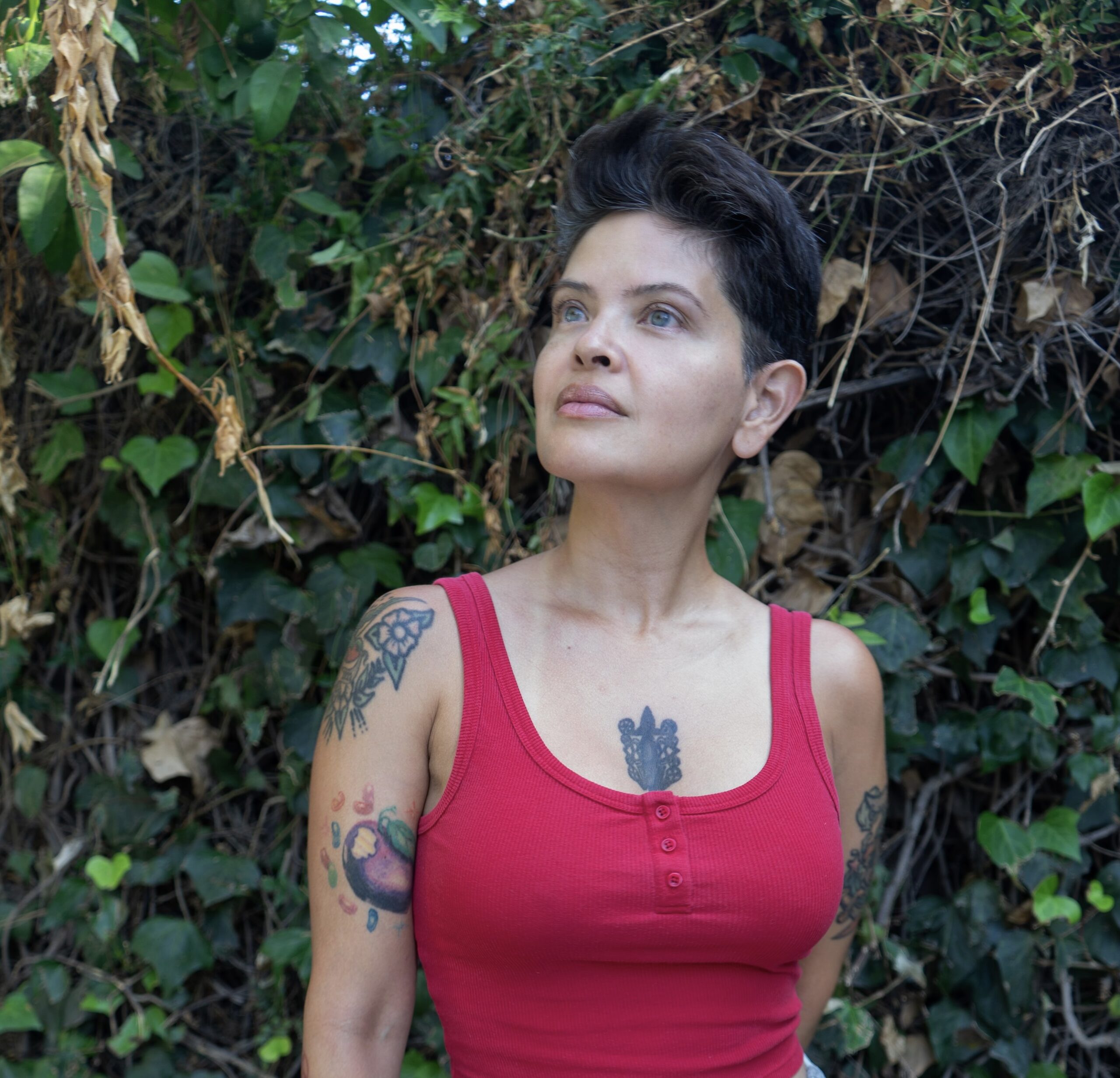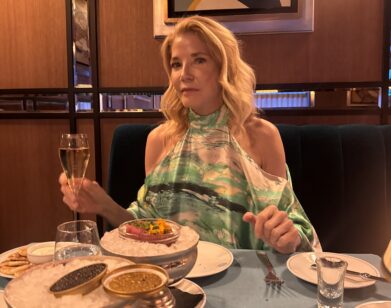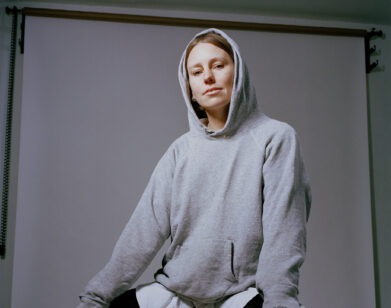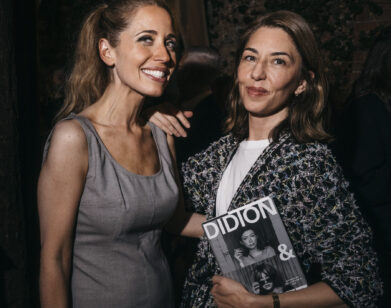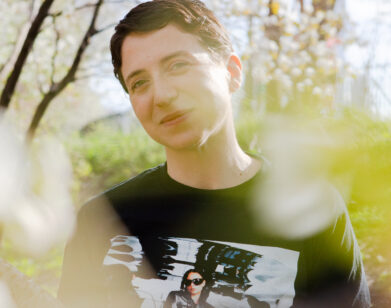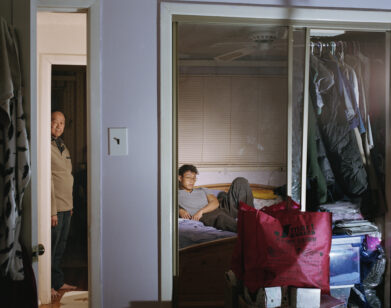LIT
Myriam Gurba Wants You to Stop Hiding From Death
I consumed most of Myriam Gurba’s new essay collection, Creep: Accusations and Confessions, while on a road trip at nighttime, my boyfriend in the driver’s seat and the black sky of outer space stretched before us. Haunting and otherwordly, like reading Goosebumps under a flashlight, the essays feature all the creeps that keep you up at night: sexual abuse, human remains, serial killers, and fascist torture tactics. As I read, I felt a figure might just pounce onto the windshield when I least expected. My right hand hovered over the central lock switch.
Throughout the book, Gurba works to understand the connections between the macabre subject matter, her Mexican cultural histories, inherited family lore, and literary influences. In the process, she interrogates and reconsiders the legacies of figures inextricable from her work, like her bohemian grandfather and Joan Didion, with whom she both provokes and resists comparison. With an imaginative combination of rigorous archival resources, magical realism, and wit, Gurba gives us no choice but to read on in spite of feeling spooked.
Days later, in the comfort and safety of the August sunlight, and just before Creep’s publication, she and I got on Zoom to discuss her fixation with death, writing about loved ones and abuse, and how she hopes to shake up our conception of “criminals.”
———
MADELINE HOWARD: So, when I read Creep, it was very fitting for the mood. My partner and I were driving to get his sister’s passport so we could fly to Colombia because his grandmother passed away. I was reading aloud to him on our drive and we had a lot to talk about. So I wanted to ask you about writing about death.
MYRIAM GURBA: So I’ll say that death is one of my favorite subjects. I’ve long been drawn to death as a muse of sorts. I think of death as one of the most creative forms of energy to ever exist, and there is a personification of death who I refer to throughout the collection. She is considered a folk saint in Mexico and in other parts of Latin America, so I referenced St. Death quite a bit. It’s been said that death is among Mexicans favorite playthings and we have something like 50 pet names for her, ranging from La Nina Blanca to La Flaca, which means the skinny girl. I think about death often because I believe that a close relationship with death is what enables us to live the best possible lives that we can. It forces us to consider what we want our future to be and what we want our legacy to be. That’s something that we can’t consider unless we develop an intimate relationship with death, so I’m always encouraging people to cultivate that.
HOWARD: This is kind of a blanket statement, but in the US, I feel like death is sheltered in our culture. It’s something you don’t talk about.
GURBA: Absolutely. I know so many people who’ve never been present when somebody has passed or who’ve never been with human remains. I find that so odd and I find that so unnatural, and I think it’s incredibly unhealthy to hide what we are all destined for. This is our collective destiny. Why are we hiding our collective destiny?
HOWARD: In the book, you say that, “Some people like my grandfather hoard the printed word. They understand the power of ephemera.” And you’re constantly weaving through old newspaper stories, historical documents, et cetera. So I’d love to know more about your research process for this.
GURBA: So I approached this essay collection, and each essay in the collection, as an assemblage. I was working in a literary manner with prose, but I was also working with pieces of ephemera that I was curating and arranging in deliberately artful ways in order to be able to create sort of a facsimile of my world that I invite the reader into. I used a lot of that ephemera in my memoir Mean to create almost a sort of scrapbook texture to that book. I wanted to bring that same sort of texture to Creep in order to demonstrate that there is a relationship between these two works. I do think that in work like mine, work that is very confessional and intimate, that sort of personal and private texture that’s created by the ephemera almost gives the reader a sense that they are creeping through my diaries. That’s an illusion. The reader isn’t actually being given access to that private world. They’re being given access to what is actually a curated gallery of objects and memories.
HOWARD: I also particularly enjoyed the chapter “Locas,” which felt very grounded in your relationship with your cousin Desiree but also explored parts of your family history. So I wondered how you came to have such a rich knowledge of everyone in your family’s lives.
GURBA: I come from a family of storytellers. Many of the stories that are incorporated into Creep are ones I feel as if I’ve inherited over time. There are stories that were told by my grandparents, aunts and uncles, my parents, so it seems as if it’s my time now to be sharing these stories because of my inheritance, and I do think of stories as part of an inheritance. We are heirs to art in addition to being heirs to other kinds of phenomena. The essay that you referenced, which details the criminalization of my cousin, is a really special one for me because my cousin came to me directly and asked me to write it. So, in a sense, this is almost a piece that she commissioned because she was so bothered by the way that crime reporters had reported on her life, and she was incredibly bothered by the paper trail created by the state of California that reduces her to the status of felon. She wanted for people to know why she was criminalized.
HOWARD: At the beginning, you write about when she stole from Walmart or something, but then you detail how it’s actually Walmart that steals land, sacred land, and people’s remains.
GURBA: I really wanted to juxtapose the popular idea in the United States of a criminal. When we say the word “criminal,” who comes to mind? I would prefer that Walmart come to mind than my cousin.
HOWARD: I admired your willingness to be honest about your family members’ actions or their past. You write, “Some people in my family mention my grandfather’s misogyny as if it were a charming yet harmless quirk, something to giggle about.” And then you write this more honest version of who he was.
GURBA: Absolutely. Part of the book’s project is an attempt at examining idols, assessing idols, giving idols their due praise, but also scolding those idols and even knocking them down if necessary. So all of those gestures are part of the book’s project. The two people or figures for whom I do that in the most direct and accessible ways are Joan Didion and my grandfather. In the case of Didion, it’s the slow understanding that I develop of the racism present throughout her work, both in her fiction and her nonfiction. And then I have a similar reckoning with my grandfather where I address the reality that I might not have become a writer myself had it not been for the lived example offered by him of this Bohemian, artful, Mexican lifestyle. But ironically, it was a way of living that was not extended to me because I’m female. So in a sense, this is a playful revenge in that I’m telling my grandfather, “You sort of inspired me to become a writer. You thought that I was incapable of doing this. You wanted to be famous. People are going to speak your name now, but it’s because of me and I’m female.” So it’s sort of a playful revenge piece.
HOWARD: I thought it was interesting how you said the white literary establishment basically gifted California to Didion. Could you talk more about our cultural reverence for her, and what you’re hoping the impact of your essay might be in terms of people revisiting her work?
GURBA: I would hope that my evaluation prompts others to engage in a reassessment of her work and a reassessment of her legacy. I’m by no means trying to “cancel” her. In fact, at the beginning of the essay, I describe what I inherited from her, so Creep is in some ways a literary genealogy and I’m situating myself within that genealogy. From Didion, I learned certain stylistic techniques, and from her I learned about a certain sort of California coolness that I kind of jokingly refer to as “California Bitch.” You know what I mean? It’s a very biting, sort of aloof California narrator that she pioneered. And I think that a lot of female writers from California understand that if we engage in that sort of unflinching approach to the world, at some point somebody’s going to draw a comparison to Didion. So I really wanted to begin by giving her her flowers, but then delve into the difficulty in her work and what I would argue is racism. I also think that there’s a geographic component to her elevation, in that she has this incredible appeal to folks on the East Coast, and because she has that appeal to folks on the East Coast, in particular an appeal to New York, you have people east of the Mississippi determining who the voice of California is. And that’s always incredibly strange to me, and I don’t really think they have the competence to do that.
HOWARD: I completely agree. Unfortunately, it’s like they’re dictating. I’m from Chicago, so your essay about going to Iowa and driving through the Nebraska field abyss, it was cool to see that represented.
GURBA: When people used to ask me about my summer plans, I would answer that I was going to be going abroad. And then when people would ask where I would say, “Iowa.” They would laugh for a second, but then nod, because it’s another country. If you’re born and raised on the coast of California, to go to the middle part of the country is shocking. It’s shocking not to have an ocean nearby. It just feels so claustrophobic to me that there are no seagulls. Where are the seagulls?
HOWARD: I hear you. I also wanted to ask you about the essay “Slimed,” where you present the concept of rape, and specifically the one you experienced as, as a practical joke, or like being slimed. I thought it was interesting how you kind of broke down these different joke structures.
GURBA: There are two different things that prompted me to write that essay. One is a response to my writing that fuses horror with humor. Some reviewers and readers have expressed to me that they find my writing difficult because of that blend. I interpret that to mean that these readers think that a comedic style has no place in a narrative that focuses on sexual violence, so I became bothered and also curious. I wanted to understand why readers were challenged by that style. The other provocation is a response that I’ve noticed feminists having to misogynist humor. There’s this knee-jerk reaction to argue that a misogynistic joke is not a joke because a particular party found it unfunny. That response bothers me a lot too because I think that jokes are incredibly important and incredibly serious and incredibly meaningful. They give us a lot of information, and I think that when we dismiss them, we do survivors and victims an incredible disservice because we’re being provided with information that helps us to understand abusers. So it was those two challenges that led me to explore why I was so uncomfortable with those issues. That’s how we got “Slimed.”
HOWARD: I actually remember my mother reading Alice Sebold’s Lucky. I had peered inside of it because I was just curious but I was young and I didn’t really understand what it was. And then when I came to this section in your book. So I’m wondering if you can speak more about that essay and the slippery slope of what happens when you are harmed.
GURBA: I read Alice Sebold’s memoir over a decade ago and it was one of several books that I read when I was on what you could call a survivor narrative binge. I was ready to face the fact that I had experienced a stranger assault. For a very long time I could not acknowledge what had happened to me and had a very difficult time acknowledging the gravity of the experience. I sought out books that would offer guidance and reflections of what I had experienced, so Sebold’s book was one of the first that I came across and I had a very mixed response to it. On the one hand, she survived violence that was in some senses similar to the violence that I had survived. But her experience with the criminal legal system and the incredible amount of faith that she continuously expresses [in it] was strange to me. What struck me as really odd when I was reading the memoir was that she misidentified a perpetrator. I started to think about when I was attacked when I was 19 years old. I had a lot of anxiety about identifying my perpetrator correctly because of the duress under which I met him. He was of the same sort of ethnic group as me, and yet I was still concerned about ID’ing the wrong person, which is why I found it so strange that this woman who doesn’t belong to the same ethno-racial group as the person who’s attacked her was so confident about who had harmed her. So I had my personal experience in the back of my mind as I was reading Lucky.
HOWARD: I think that pretty much the hardest pill for people to swallow is not getting what we’ve been taught is justice in the way that—
GURBA: I mean, we’re socialized in the United States to believe that justice is punishment, so I understand why Sebold was so adamant about a person being punished for what was done to her. But I would prefer to live in a country where we don’t equate punishment with justice. I would prefer that justice manifest as support for survivors and, in particular, material support, because it’s very expensive to survive sexual violence. I think that is what is most broadly misunderstood about sexual violence, that we pay for it for the rest of our lives in some way, shape, or form. Sometimes that’s referred to as a “rape tax,” but people don’t see us as paying that tax. I would rather see an incredible amount of effort and resources funneled into prevention, because punishment not only fails to curb sexual violence, but so few people who perpetrate sexual violence are punished. It’s criminal on paper, but it’s a broadly accepted social practice.
HOWARD: Do you have any advice for people who are looking to write about their assaults or their abusive relationships?
GURBA: The title essay was the most difficult essay to write because I had to draw on memories that I would prefer to leave alone. But I had to probe them in order to accurately portray the entrapment that I experienced. My process for writing that essay involved stopping when I knew that I had to, and that feeling of having to stop was something that was very embodied for me. I’ll give you an example of what I mean by that. I might write a section where I’m detailing a certain assault that I experienced at the hands of my abuser, and I might have a sensation in my gut of almost being sort of punched in the gut. That sensation is telling me that it’s time to stop. So it was paying very close attention to my body that was required in order to kind of set a pace for myself. My gut was often communicating to me when I needed to start and stop. That was a very difficult essay to write. I made the deliberate choice of being very specific and very detailed when I wrote about instances of violence. The reason that I was so transparent about the violence is this: When I was still surviving domestic violence, I had begun to understand my predicament. I had begun to understand that I was trapped, that I was experiencing intimate partner violence, but I could not bring myself to use that language to describe what was happening to me. Part of my inability to name what was happening to me came from the fact that when I would look for descriptions of domestic violence that mirrored my own, I was not finding them. What I would often find were very, very brief descriptions of what survivors had experienced. Maybe the descriptions would be a paragraph, and they’d be very euphemistic. I did find a few detailed case studies. When I read those, I finally saw myself reflected, which enabled me to name what was happening to me. So what I’m attempting to do is to offer that same experience to other women who might find themselves reflected in the work.
HOWARD: I feel invigorated by that. And I really appreciate you speaking with me.
GURBA: Thank you so much. This was really fun.

